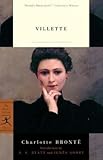 Villette by Charlotte Brontë
Villette by Charlotte BrontëMy review
rating: 4 of 5 stars
This was my 3rd reading of Charlotte Bronte's final novel. Between my 1st and 2nd reading, I also read her early novella "The Professor" which essentially works with the same material but wasn't published in her lifetime. The material is (I'll claim) from her own life- her early days as a teacher in a Belgian girl's school. Most biographies of Bronte stress how much she hated this period, with the one exception being that it appears she fell in love with a married professor at the school.
Thus, it doesn't seem like much of a stretch to read "The Professor" and "Villette" as Bronte's fictionalizing of her own personal misfortune. In many ways, the two works remind me of Jane Austen's "Persuasion", with the author bringing her unhappy love story to happy conclusion.
But a few words on "Villette" in particular. I have to say, third time is not the charm. I thought it had only been 4 years since my last reading, but I could hardly recognize the book. I groaned and rolled my eyes at the increasingly slow wind up to denouement, with all the anti-French and anti-Catholic ravings along the way. I did care about Lucy Snowe, but I also knew what she was headed for, and frankly, it wasn't worth the 580 page journey to get there.
"Villette" is interesting however as an anti-Jane Eyre. Bronte (in the voice of Lucy Snowe) seems to continually subvert the readers' expectations of a Jane Eyre-type leading lady. Bronte almost delights in not letting Lucy be passionate, articulate or even very intelligent. Just as Jane Eyre challenged the assumption of heroines needing to be beautiful and wealthy, Lucy Snowe challenges the idea of heroine-ism at all. The story seems to be about fate, but a fate that appears kind to the privileged, and ruthless to the dejected.
Nonetheless, I still believe the last five pages of this book are one of the greatest achievements ever in English literature. So deeply personal, yet unrelentingly ambivalent. Sound like an oxymoron? It is, but its earned by the fact that Bronte is writing some 20 years after a lost love and needs to say something different than the simple happiness which closes "The Professor". "Villette" reminds you that sometimes a happy ending can be just as painful to write as a tragic one. And for that, I think I will always need to revisit "Villette."
View all my reviews.

No comments:
Post a Comment